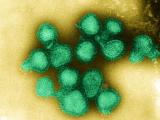Today the Centers for Disease Control and Prevention (CDC) released 2018-19 recommendations of the Advisory Committee on Immunization Practices (ACIP) on seasonal flu vaccines in the United States, bringing to the forefront the question of how early to get the annual shot or nasal spray.
The recommendations were published in Morbidity and Mortality Weekly Reports, and several experts said that, although waning protection throughout the season can be an issue, it's probably best not to wait too long to get vaccinated.
Both trivalent (three-strain) and quadrivalent (four-strain) vaccines will be available for the upcoming season. Trivalent vaccines will comprise an A/Michigan/45/2015 (H1N1)pdm09–like virus, an A/Singapore INFIMH-16-0019/2016 (H3N2)–like virus, and a B/Colorado/06/2017–like virus (Victoria lineage). Quadrivalent vaccines will contain an additional influenza B vaccine virus, a B/Phuket/3073/2013–like virus (Yamagata lineage).
The hope is that these strains prove to be a better match than last season's vaccine, which showed only a 36% efficacy overall and a 25% against H3N2, the most common circulating strain. ACIP does not recommend any one listed flu vaccine over another during this flu season.
As in years past, ACIP recommends all people ages 6 months and older receive the seasonal flu vaccine, but unlike the last two flu seasons, the experts now say FluMist (the live attenuated nasal spray vaccine) may be used on appropriate patients if desired. The recommendation was first announced in February, after experts weighed conflicting data on FluMist's effectiveness.
FluMist had been considered beneficial for needle-averse school-age kids, but it performed poorly against the H1N1 strain seen in the 2009 pandemic. But AstraZeneca, the company that makes FluMist, tweaked its formula with a new H1N1 strain and presented more favorable data to ACIP.
Late autumn vaccination timing
The recommendations also mention the timing of vaccine, suggesting that vaccine recipients be vaccinated by the end of October. But some clinics and pharmacies are already offering flu vaccine, leaving patients to wonder how early is too early.
"Flu activity picks up by October, so it's not unreasonable to get vaccinated then," said Lisa Grohskopf, MD, one of the lead authors of the recommendation. "If flu was more predictable, then we could offer a better recommendation of when to get vaccinated."
Some in the influenza research community warn that too-early vaccination results in an at-risk population during long flu seasons. Protective immune response generated by the vaccine takes 1 to 2 weeks to develop, the CDC says, and recent research shows that moderate effectiveness lasts about 6 months.
"Although delaying vaccination might result in greater immunity later in the season, deferral also might result in missed opportunities to vaccinate, as well as difficulties in vaccinating a population within a more constrained time period," ACIP's recommendations say. "Vaccination efforts should continue throughout the season because the duration of the influenza season varies, and influenza activity might not occur in certain communities until February or March.”
Last year's flu season was one of the most severe in recent years, with a high number of pediatric deaths and hospitalizations. Most deaths occurred in patients who had not been vaccinated against the flu, the CDC said.
Experts: Best to wait a bit—but not too long
"There is some data showing waning immunity over time, but from a public health standpoint, my main worry is not that people get vaccinated too soon, but that people do not get vaccinated," said Matthew Zahn, MD, chairman of the public health committee for the Infectious Diseases Society of America.
"For those who are aware of the vaccine and routinely get it, it is certainly reasonable to wait until September or October," Zahn said. "But every year we hear the stories of people who intend to get vaccinated but as the holidays come up they don't."
In a study published just yesterday in Vaccine, Australian researchers mined US flu vaccine data to see how timing affects immunity in adults 65 and older. The optimal time for vaccination changed in each season, ranging from mid-August to mid-November, depending on circulating strains.
Michael L. Jackson, PhD, MPH, an investigator at Kaiser Permanente Washington Health Research Institute said he's seen a shift in recommendations about timing in recent years, away from a model of "as soon as possible," and more toward the end of autumn.
"We have to balance the uncertainty of when will the flu start with the challenges of getting a large part of the population vaccinated at one time," Jackson said.
See also
Aug 24 ACIP recommendations
Feb 15 CIDRAP News story "US study finds 36% flu vaccine protection, 25% against H3N2"
Feb 21 CIDRAP News story "CDC vaccine panel brings back FluMist for 2018-19 season"
Aug 23 Vaccine study





















